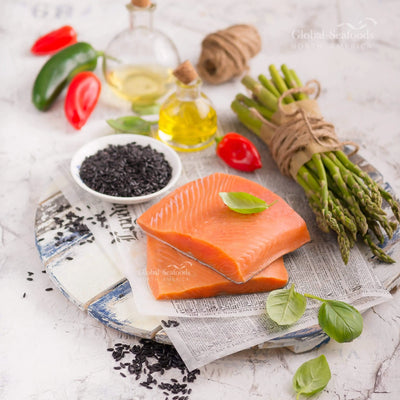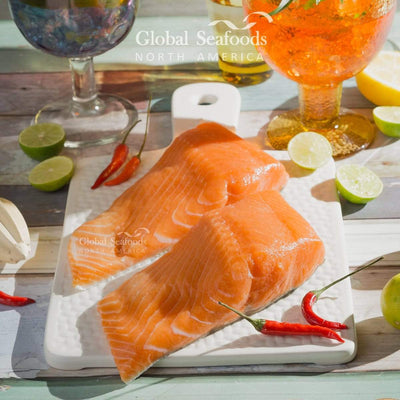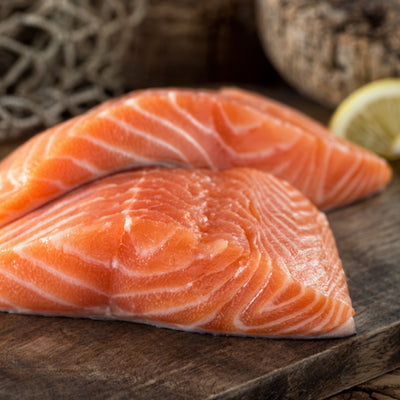Salmon vs. Tilapia: A Complete Guide to Nutrition & Health Benefits

🐟 Salmon vs. Tilapia: Which Fish Is Best for Your Diet? 🍽️
When it comes to healthy seafood choices, salmon and tilapia are two of the most widely enjoyed fish. But instead of asking “Which is better?”, the real question is: “Which fish best fits your dietary needs?”
✔ Salmon is a fatty fish rich in omega-3s, ideal for heart and brain health.
✔ Tilapia is a lean protein source, perfect for those on a low-fat diet.
Both fish are nutrient-dense, offering high-quality protein, essential vitamins, and minerals. Let’s explore what makes each unique, their health benefits, and how to incorporate them into your diet!
📊 Nutritional Breakdown: Salmon vs. Tilapia
| Nutrient | Salmon (3.5 oz / 100g) | Tilapia (3.5 oz / 100g) |
|---|---|---|
| Calories | ~208 kcal | ~128 kcal |
| Protein | 22g | 26g |
| Fat | 13g | 3g |
| Omega-3s | ~2.5g | ~0.2g |
| Vitamin D | 570 IU | 40 IU |
| Vitamin B12 | 4.9 mcg | 1.7 mcg |
| Selenium | 46 mcg | 47 mcg |
🔑 Key Takeaways:
✔ Salmon is higher in healthy fats and omega-3s, which promote heart and brain health.
✔ Tilapia is a lean, high-protein option, ideal for muscle growth and weight management.
✔ Both provide essential vitamins & minerals, making them excellent choices for a balanced diet.
🔥 The Benefits of Eating Salmon
Salmon is often considered a superfood, thanks to its rich nutrient profile.
💪 Why You Should Eat More Salmon:
✔ Rich in Omega-3s – Supports heart health, brain function, and reduces inflammation.
✔ Great for Bone Health – High vitamin D levels improve calcium absorption.
✔ Boosts Skin & Hair Health – Omega-3s keep skin glowing and hair strong.
✔ Excellent for Active Lifestyles – A protein powerhouse that aids muscle recovery.
✔ Versatile in Cooking – Enjoy it grilled, baked, pan-seared, smoked, or raw in sushi!
💡 Where to Buy the Best Salmon?
For fresh, high-quality salmon, check out Global Seafoods! 🐟 They offer:
- Sockeye Salmon Fillets – Bold, deep red, and packed with flavor.
- King Salmon – Buttery and rich, perfect for indulgent meals.
- Coho Salmon – A milder, versatile option.
🔥 The Benefits of Eating Tilapia
Tilapia is a fantastic choice for those looking for a lean, high-protein fish that is easy to cook and mild in flavor.
💪 Why Tilapia Deserves a Spot in Your Diet:
✔ Lean & Low-Calorie – A great choice for weight management and heart health.
✔ Mild & Adaptable Flavor – Works well in stir-fries, tacos, and grilled dishes.
✔ Packed with Protein – Essential for muscle growth, recovery, and energy levels.
✔ Rich in Selenium & Phosphorus – Supports thyroid function and immune health.
✔ Cooks Quickly – Ideal for busy weeknights and meal prep.
💡 Looking for high-quality seafood? Check out Global Seafoods for fresh, responsibly sourced fish!
🎣 Salmon vs. Tilapia: What’s the Best Choice for You?
The right choice depends on your dietary goals and taste preferences:
✔ Choose Salmon If:
- You want a rich source of omega-3s for heart and brain health.
- You’re looking for a bold, flavorful fish that stands out in any dish.
- You need vitamin D to support bone strength and immunity.
✔ Choose Tilapia If:
- You prefer a lean, high-protein option with less fat.
- You enjoy a mild, delicate flavor that works well in various recipes.
- You’re looking for a budget-friendly, easy-to-cook fish.
💡 Final Verdict: There’s no “better” choice—just the right choice for your dietary needs! Both salmon and tilapia are excellent additions to a balanced diet.
🌊 Where to Buy the Best Seafood?
For premium-quality seafood, check out Global Seafoods! 🐟
✨ Top Picks:
- Sockeye Salmon – Omega-rich and flavorful.
- Dungeness Crab Meat – Sweet, tender, and packed with protein.
- Cocktail Claw Crab – Perfect for quick, delicious seafood meals.
📦 Order today for fresh seafood delivered straight to your door! 🚀
🤔 FAQs About Salmon & Tilapia
Q1: Can I eat both salmon and tilapia in my diet?
✔ Absolutely! Incorporating both fish gives you a variety of nutrients, flavors, and textures.
Q2: Which fish is better for weight management?
✔ Tilapia is lower in fat and calories, making it an excellent choice for weight-conscious diets.
Q3: Which fish has more omega-3s?
✔ Salmon has significantly more omega-3s, supporting heart and brain health.
Q4: Can I substitute tilapia for salmon in recipes?
✔ Yes! Just keep in mind that salmon is richer and more flavorful, while tilapia is mild and more neutral.
🏆 Conclusion – Two Great Choices for a Healthy Lifestyle 🏆
Both salmon and tilapia bring unique nutritional benefits to the table.
🥢 For omega-3s and bold flavor? Go with salmon.
🥢 For lean protein and versatility? Choose tilapia.
Incorporating both into your diet ensures a balanced intake of essential nutrients while keeping your meals exciting and delicious!
🛒 Ready to enjoy the best seafood?
🔥 Shop now at Global Seafoods!
Also in News

How to Make Sea Bream Sushi With Dry-Aged Tuna & Crab Roll — Step-by-Step With Chef Joshua
A complete guide to making Sea Bream sushi at home, including filleting, curing, slicing, and building a Dry-Aged Tuna & Crab sushi roll. Chef Joshua shares professional tips for restaurant-quality results.

Cooked Crab for Game Night: Everything You Need for a Perfect Seafood Party
Take your game night to the next level with a Cooked crab party. Learn the best recipes, cooking tips, and hosting hacks for a memorable seafood feast.

Steam Crab for Date Night: A Romantic Guide to the Perfect Seafood Feast
Make your next date night unforgettable with a romantic Steam crab experience. This guide covers everything you need to know, from ambiance to the best crab varieties.








